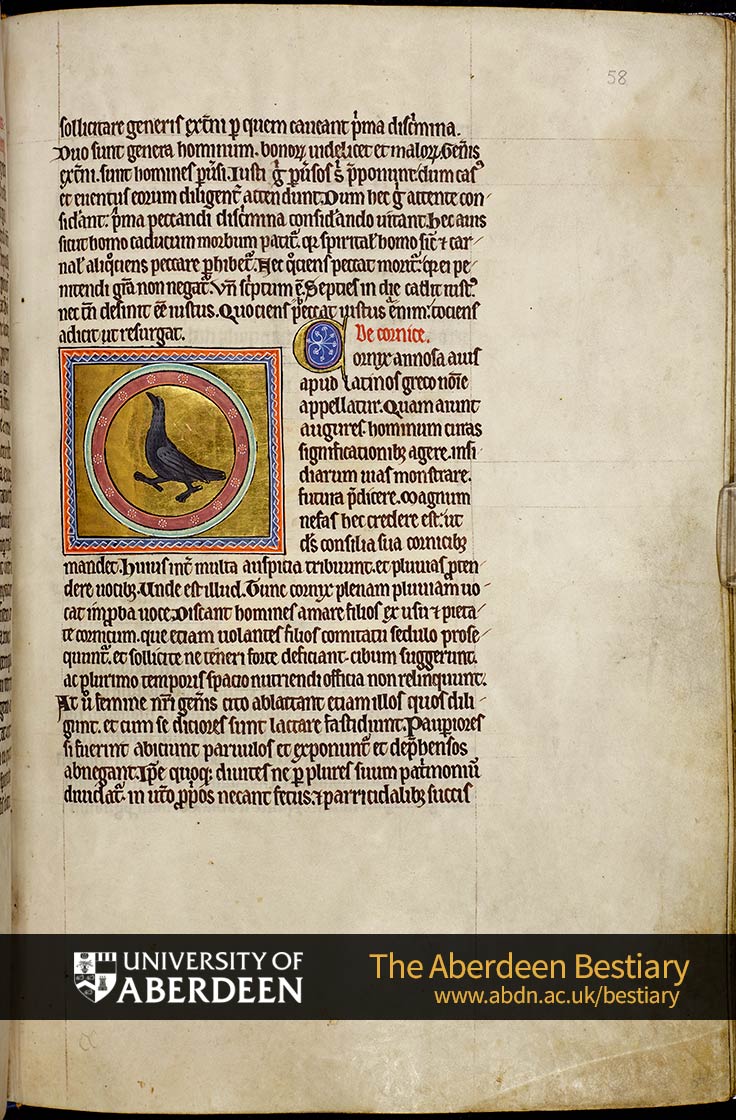Folio 58r - the quail, continued. De cornice ; Of the crow
of another species, through whom they guard against this early danger. There are two kinds of men, the good and the bad. The 'other species' is that of wicked men. The righteous, therefore, place the wicked before them, and watch closely what happens to them. By watching carefully, they see the early danger of sin, and avoid it.
This bird, like man, suffers from the falling sickness, in the same way that the spiritually-minded man, just like the carnally-minded man, is said to sin at times. No matter how often he sins, he does not die, because the grace of penitence is not denied him. On this subject it is written: 'The righteous man falls seven times in a day' yet he does not cease to be righteous (see Proverbs, 24:16). For as often as the righteous man sins, so often does he go on to rise again.
Of the crow
The crow is a long-lived bird, called cornix in Latin and Greek.
Soothsayers assert that the crow can represent by signs the concerns of men, show where an ambush is laid and foretell the future. It is a great crime to believe this - that God confides his intentions to crows. Among the many omens attributed to crows is that of presaging by their caws the coming of rain. Hence the line: 'Then the crow loudly cries for rain' (Virgil, Georgics, 1, 388).
Let men learn from the crow's example and its sense of duty, to love their children. Crows follow their young in flight, escorting them attentively; they feed them anxiously in case they weaken. A very long time passes before they give up their responsibility for feeding their offspring.
In contrast, women of our human race wean their babies as soon as they can, even the ones they love. Rich women are altogether averse to breastfeeding. If the women are poor, they cast out their infants, expose them and, when the babies are found, deny all knowledge of them. The rich themselves also kill their children in the womb, to avoid dividing their estate among many heirs; and with murderous concoctions
- Commentary
-
Commentary
Text
The crow.
Illustration
Portrait if the crow.
Comment
Folio mark CC' in bottom left margin. Initial type 2.
Folio Attributes
- Transcription and Translation
-
Transcription
sollicitare generis externi per quem caveant prima discrimina.\ Duo sunt genera hominum, bonorum videlicet et malorum. Generis\ externi, sunt homines perversi. Iusti igitur perversos sibi preponunt, dum casus\ et eventus eorum diligenter attendunt. Dum hec igitur attente con\ siderant, prima peccandi discrimina considerando vitant. Hec avis\ sicut homo caducum morbum patitur, quia spiritalis homo sicut et car\ nalis aliquociens peccare perhibetur. Nec quociens peccat moritur, quia ei pe\ nitendi gratia non negatur. Unde scriptum est: Septies in die cadit iustus,\ nec tamen desinit esse iustus. Quociens enim iustus peccat, totiens\ adicit ut resurgat. \ De cornice \ Cornix annosa avis\ apud Latinos Greco nomine\ appellatur. Quam aiunt\ augures, hominum curas\ significationibus agere, insi\ diarum vias monstrare,\ futura predicere. Magnum\ nefas hec credere est, ut\ deus consilia sua cornicibus\ mandet. Huius inter multa auspicia tribuunt, et pluvias proten\ dere [PL, portendere] vocibus. Unde est illud: Tunc cornix plenam pluviam vo\ cat improba voce. Discant homines amare filios ex usu et pieta/te cornicum, que etiam volantes filios comitatu sedulo prose\ quuntur, et sollicite ne teneri forte deficiant, cibum suggerunt,\ ac plurimo temporis spacio nutriendi officia non relinquunt.\ At vero femine nostri generis cito ablactant etiam illos quos dili\ gunt, et cum se diciores sunt lactare fastidiunt. Pauperiores\ si fuerint abiciunt parvulos et exponuntur [PL, exponunt] et deprehensos\ abnegant. Ipse quoque divites ne per plures suum patrimonium\ dividatur, in utero proprios necant fetus, et parricidalibus succis\Translation
of another species, through whom they guard against this early danger. There are two kinds of men, the good and the bad. The 'other species' is that of wicked men. The righteous, therefore, place the wicked before them, and watch closely what happens to them. By watching carefully, they see the early danger of sin, and avoid it. This bird, like man, suffers from the falling sickness, in the same way that the spiritually-minded man, just like the carnally-minded man, is said to sin at times. No matter how often he sins, he does not die, because the grace of penitence is not denied him. On this subject it is written: 'The righteous man falls seven times in a day' yet he does not cease to be righteous (see Proverbs, 24:16). For as often as the righteous man sins, so often does he go on to rise again. Of the crow The crow is a long-lived bird, called cornix in Latin and Greek. Soothsayers assert that the crow can represent by signs the concerns of men, show where an ambush is laid and foretell the future. It is a great crime to believe this - that God confides his intentions to crows. Among the many omens attributed to crows is that of presaging by their caws the coming of rain. Hence the line: 'Then the crow loudly cries for rain' (Virgil, Georgics, 1, 388). Let men learn from the crow's example and its sense of duty, to love their children. Crows follow their young in flight, escorting them attentively; they feed them anxiously in case they weaken. A very long time passes before they give up their responsibility for feeding their offspring. In contrast, women of our human race wean their babies as soon as they can, even the ones they love. Rich women are altogether averse to breastfeeding. If the women are poor, they cast out their infants, expose them and, when the babies are found, deny all knowledge of them. The rich themselves also kill their children in the womb, to avoid dividing their estate among many heirs; and with murderous concoctions

